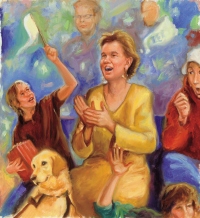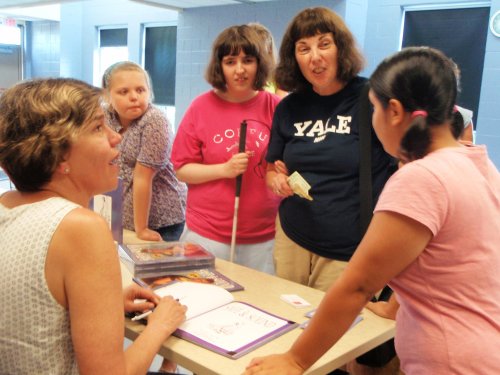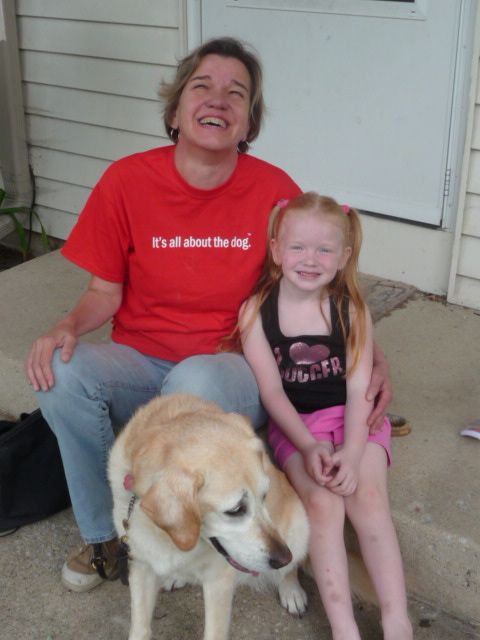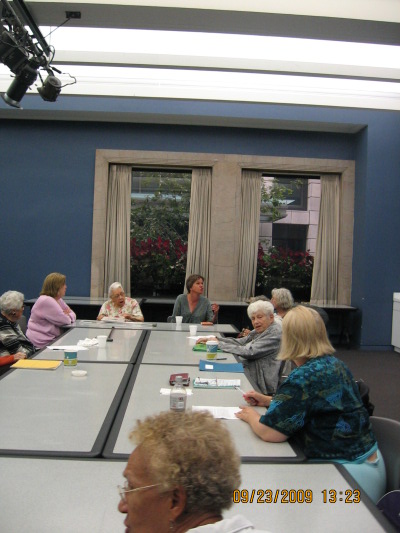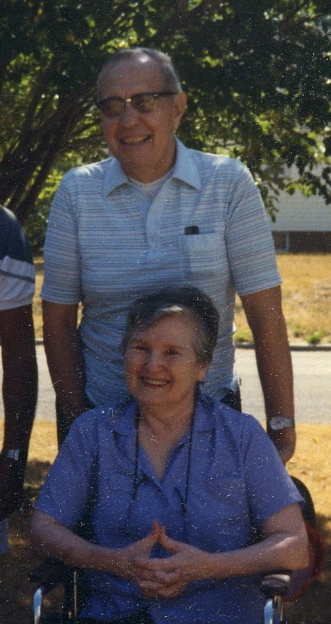Every Wednesday, the seniors in my memoir-writing class pass a pouch of Scrabble tiles around the table. Whoever picks “A” reads their work aloud first, then “B” and so on. Last week, I threw a wrench into the works. I passed around a Ziploc bag full of loose change instead. “Just pick a coin,” I told them. While the Ziploc bag went around the room, I’d explain next week’s assignment.
That was the plan, at least. One thing I hadn’t anticipated -– but should have–is how averse some older people can be to, ahem, change. One student chose a coin, passed the bag. The next student asked her neighbor why she was passing a bag of coins. “Where are the tiles?” The neighbor didn’t know. The student with the Ziploc shrugged her shoulders, gave in, chose a coin, passed the bag. The next student asked why she was passing a bag of coins. “Where’s the tiles?” “What happened to the tiles?” The neighbor didn’t know. A student across the table tried to explain.
It got worse. Half the students (and not just the ones with diagnosed vision problems like me) couldn’t read the dates on the coins: too small. Wanda to the rescue. “Don’t worry!” she called out, digging in her bag. “I have a magnifying glass!”
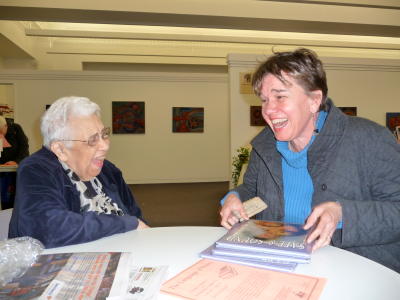
Wanda always comes prepared. That’s her, helping me sign books last year at the Chicago Cultural Center.
Once everyone settled down and determined the date on their coin, I said I wanted them to write about something that went on in their lives that year. “I got 1978,” one of them whined. “I can’t remember anything that went on that year!” I suggested that if they got a year that didn’t ring a bell, they could do some research. Find out what happened in the news that year, maybe that would jog their memories.
”Keep in mind, though,” i told them.”I want you to write a memoir, not a report.” I told them that if, let’s say, they chose a coin with the year 2006 on it, I didn’t want them to write something like “The year 2006 was the year a coal mine disaster trapped 13 miners for nearly two days. Only one miner survived” and go on to write how some newspapers got it wrong, announced early that all the miners had been rescued when, really, they hadn’t. That is all very interesting stuff, I told them. But it’s a report, not a memoir. I want a memoir.
“But if you picked a coin with the year 2006 on it, and researching the coal mining disaster jogs your memory, reminds you how sad you were about that tragedy, how it made you think of your grandfather who was a coal miner, or how much the news inspired you to live more fully, then go ahead and mention the coal mine disaster in your essay. Give your readers some background.”
“What if you don’t have any coal miners?” one of them asked. “My people weren’t coal miners.” I told her to see me after class, we needed to get going. Otherwise we’d never have enough time to read this week’s essays, about The Very Best Summer Ever.
At the end of class a gaggle of students gathered with questions about the next assignment. One thought maybe 1986 was the year her husband left her, but she wasn’t absolutely sure. This student had no children, and she never married again. Last Wednesday was the first time she even hinted at writing about how she felt about her husband leaving. “How about you just say 1986 was the year that happened,” I whispered. “Creative non-fiction!” She giggled. Another student never was able to determine if her coin said 1966 or 1968. “how about if I write about 1967?” I said fine.
As Hanni and I got near the door to exit the classroom, a student kindly offered to walk us outside. She’d chosen 1968, the year she’d married her second husband. She and her husband were both very involved in labor unions, and I was thrilled that she, of all the students, had chosen the year 1968. “So much happened that year, I shouted to her above the Michigan Avenue street noise. Martin Luther King, Jr. was assassinated that year. The Tet Offensive. The Democratic Convention here in Chicago. The Riots. “What month did you get married?” I asked. She told me it was May. “Oh,” I said, my voice growing somber.
“The same month Robert Kennedy was killed.”
RFK was killed a few weeks after they got married, she told me. Her husband used to leave the house around 6 in the morning for work each day, and on that morning she got out of bed to come down to kiss him goodbye. “I came down the stairs, and there he was, sitting on the couch, crying,” she’d never seen him cry before. “He’d turned on the morning news, that’s where he heard.”
This student’s husband died a few years ago. I asked if her children (they had a blended family, her husband had children before this second marriage, too) knew their dad cried when he heard about Bobby’s assassination. “No,” she said. “I don’t
think they know that.” I urged her to write about that morning in May, 1968.
I hope she does. I’ll find out tomorrow: We meet at 11:30.
